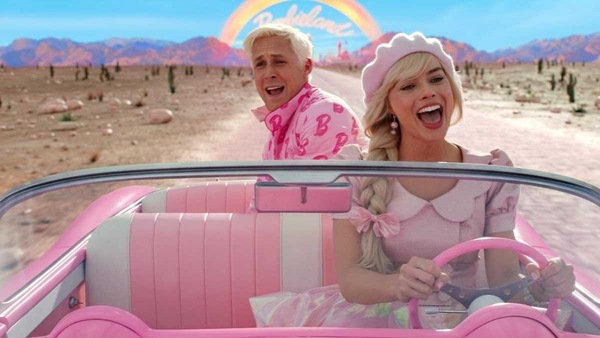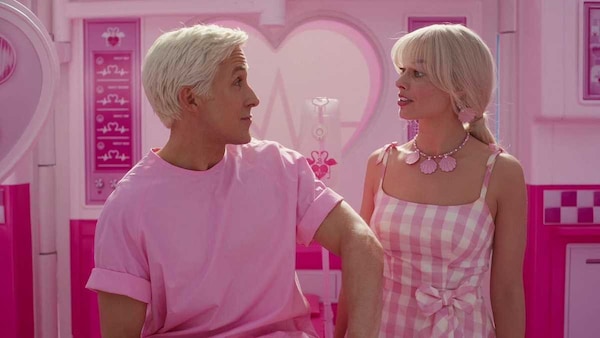Barbie: The Empty & Entertaining Glow Of Greta Gerwig’s Film
This is #CineFile, where our critic Rahul Desai goes beyond the obvious takes, to dissect movies and shows that are in the news. Today: Barbie.

Last Updated: 09.57 PM, Jul 21, 2023
I have a sneaky feeling that Barbie – the iconic plastic doll of perfect pinkness and curated agency – was the last addition to Barbie, Greta Gerwig’s latest film about curated pinkness and perfect agency. I suspect the toy came into the picture at the very end, when the film-makers found themselves wondering how to spell out (a subset of “sell out”) a social comedy while sounding self-aware about it. What’s the coolest way to human-splain feminism, wokeness, consumerism and patriarchy-bashing while turning the film’s didactic tone into a pretty in-joke? By setting it in that fantasy-plastic world, of course, where conversing in poker-faced subtext and blatant commentary defines the film’s live-action gimmick.
The creative (or un-creative) license is on the platter when pre-designed dolls talk in pre-designed observations and pre-dated gags. That way, nobody can blame the literal messaging; if anything, it’s supposed to be smart. Nobody can blame the emotional fakeness; if anything, it’s supposed to be audacious. What’s more, toy corporates Mattel will be lauded for being a good sport, playing the fool and critiquing their most popular product…and possibly mega-marketing this critique into a multi-million dollar movie franchise? Now that’s brand consciousness. Win-win-win.
I can’t lie: Barbie is fun while it lasts. I smiled at most of the film. It’s an inventive, snarky and lightweight riff on the tragic contradictions of womanhood. Its selling point is that there is no depth. What we see and hear is what we get, albeit in a shiny and good-looking package. There is nothing left to the imagination because exposition is the language of this imagination. The film revolves around a place called Barbieland, a utopian society led and propelled by independent, happy, diverse and self-sufficient Barbies. The doctors, builders, lawyers, journalists, politicians and even the President are Barbies of all colours and ethnicities and sizes, most of whom are best-selling and demographic-friendly dolls in the real world. (Some are discontinued, like Pregnant Barbie and Weird Barbie, whose owner “played with her too hard”). Our protagonist is Stereotypical Barbie (Margot Robbie), the most gorgeous and generic of them all. All this high-heeled blonde bombshell does is wake up in her open home, grin, brush and eat (with hand gestures of course), float from her roof to the garden (because Barbies don’t walk, do they? They’re lifted from one space to another), drive her engineless car, wave “Hi Barbie” to other Barbies, and go to the beach where different Kens – including Ken (Ryan Gosling) – pine for her attention. They matter only if she looks at them. The Kens ache to be invited to the Barbie dance parties. But the female dolls don’t need their male counterparts to feel good and successful about themselves.

The Barbies are under the impression that, by merely existing, they have taught little girls in the Real World to be the loftiest versions of themselves. But the pristine matriarchal land is thrown into disarray when Stereotypical Barbie wakes up one morning with flat feet, cellulite and thoughts about death. The reverie is shattered, and she seeks the counsel of the outcast, Weird Barbie (Kate McKinnon), to ‘cure’ herself. The solution: Travel through a portal to the real world (or whatever Los Angeles qualifies as) and find/heal the girl playing with Stereotypical Barbie. So Barbie sets out with castaway Ken, only to realize that this world is divided about her and what she symbolizes. It’s also the absolute opposite of Barbieland, anything but utopian, too human, very patriarchal, where men rule the roost and assume the key roles in society. This is most evident from the conference room scenes at Mattel, where a group of suited men with flashy degrees – led by a ball-talking CEO (Will Ferrell doing his usual stuff) – come up with ideas of how to ‘sell female agency’. These suits aren’t exactly greedy and evil comic villains; they’re more like well-meaning goofballs who represent capitalist dream-makers. You can sense that Gerwig might have lost a few IP arguments with Mattel; the sanitized silliness of the men suggest that the company was only willing to go that far in terms of their own image. Meanwhile, a sidelined Ken is amazed by the casual misogyny in this dimension, and decides to carry the toxicity back to Barbieland, pass it on to other Kens, and turn the place into a raging masculine cesspit of gym bodies, horses, women waitresses and sexy mansplaining.

Once Stereotypical Barbie finds her human, a single mother and Mattel employee named Gloria (the inspired anti-Ugly-Betty casting of America Ferrera), the film sort of becomes a snake that keeps swallowing itself. A plot being deliberately flimsy and self-critical can only work so long. A few amusing face-offs and feminist-101 monologues later, there’s a sense that the entertainment of Barbie is still shaped by its physical staging (the eye-popping production design, costumes, zany one-liners, Margot Robbie’s all-in enthusiasm and Ryan Gosling’s grown-up comic timing). The intellectuality – or what we like to call “subversion” – is not madly original; The Truman Show is yet to be dislodged from the top of that meta-cultural podium. I do like the fact that Robbie milks her own desire to be more than just an impossibly beautiful movie star. Her Barbie wants to shatter the Stereotype and be human (translation: an acclaimed actress); she hopes to be seen as someone with substance and realism. Robbie’s flawless looks used to work against her wide-ranging talent and ambition, but her spectacular commitment to Barbie – like last year’s Babylon – signals the end of her Brad Pitt Syndrome.
The film’s style reminds me of what animated superhero spoofs like The Lego Batman Movie achieve so successfully, occupying a genre and affectionately sending it up at once. Except Barbie aims to do the same at a clunkier societal level, trying to mean something more than its young candyfloss exterior. But there’s a difference between mining deadpan text for chuckles and mining it for actual commentary. The latter is awkward, because the self-seriousness of the words spoken and feelings felt reduce the film’s range to that of a campy internet skit. Real characters spelling their existentialism out are not the same as artificial characters selling their personalities out.

The makers will have us believe that the irony of Barbie being the most publicized tentpole movie in recent memory is written into the film’s conceit and aesthetic. Gerwig herself will have us believe that she cares for the all-time parable of the toy doll; that she recognizes the paradoxical voice of her own mission. But what we believe is futile is the face of a film that over-owns its cleverness. There’s not a scene that doesn’t know it’s a win-win-win one. There’s not a frame unaware that – in this hyperlinked age of commodified truths – admitting to one’s (artistic) limitations is better than not having any. Movies like Barbie know that they’re magnanimous and witty, that they’re good at being childish and squeamish at being pensive. And, keeping with this designer-kit honesty, I’m not sure how to feel about it when the end credits roll.
Let’s just say that if this film were one of the dolls in Gerwig’s Barbieland, she would be called Movie Barbie, an annoyingly elastic Barbie who becomes a celebrity for being fashionably vulnerable, cracking jokes about herself, opening up to strangers, mocking her own roots, telling deceptively simple stories, taking the shape of those watching her, and laughing her way to a pink bank. Which is to say: It’s Movie Barbie’s world, we’re just Ken-ning in it.

